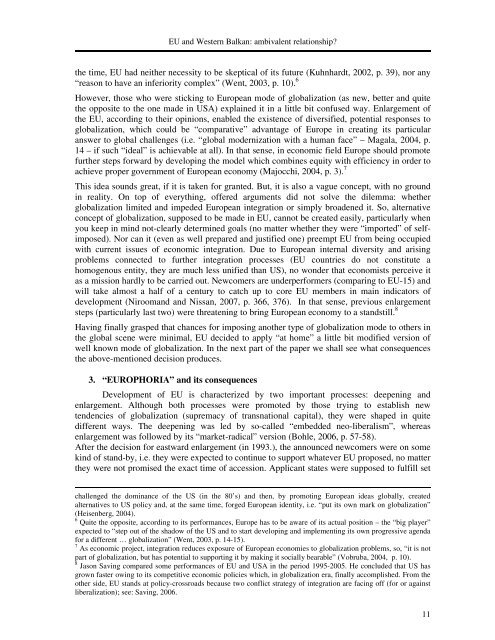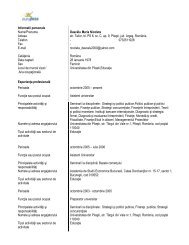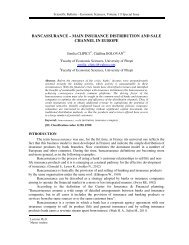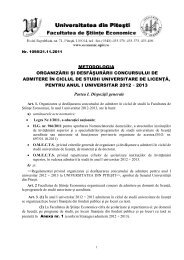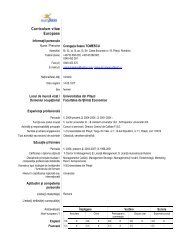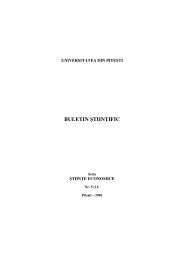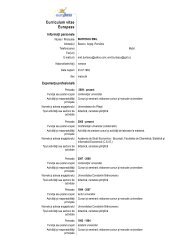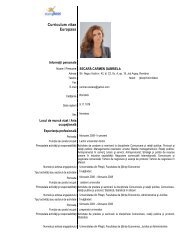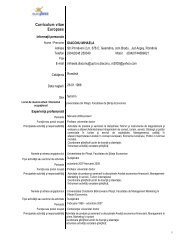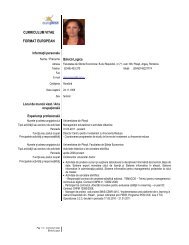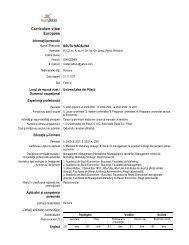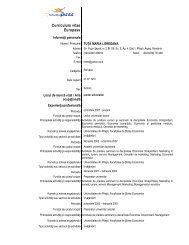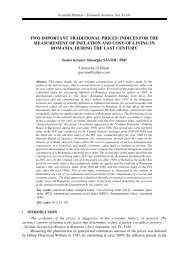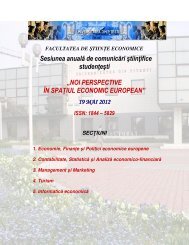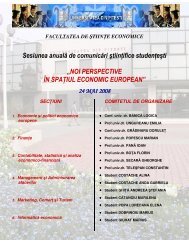buletin Åtiin ific - Facultatea de Stiinte Economice - Universitatea din ...
buletin Åtiin ific - Facultatea de Stiinte Economice - Universitatea din ...
buletin Åtiin ific - Facultatea de Stiinte Economice - Universitatea din ...
- No tags were found...
You also want an ePaper? Increase the reach of your titles
YUMPU automatically turns print PDFs into web optimized ePapers that Google loves.
EU and Western Balkan: ambivalent relationship?the time, EU had neither necessity to be skeptical of its future (Kuhnhardt, 2002, p. 39), nor any“reason to have an inferiority complex” (Went, 2003, p. 10). 6However, those who were sticking to European mo<strong>de</strong> of globalization (as new, better and quitethe opposite to the one ma<strong>de</strong> in USA) explained it in a little bit confused way. Enlargement ofthe EU, accor<strong>din</strong>g to their opinions, enabled the existence of diversified, potential responses toglobalization, which could be “comparative” advantage of Europe in creating its particularanswer to global challenges (i.e. “global mo<strong>de</strong>rnization with a human face” – Magala, 2004, p.14 – if such “i<strong>de</strong>al” is achievable at all). In that sense, in economic field Europe should promotefurther steps forward by <strong>de</strong>veloping the mo<strong>de</strong>l which combines equity with efficiency in or<strong>de</strong>r toachieve proper government of European economy (Majocchi, 2004, p. 3). 7This i<strong>de</strong>a sounds great, if it is taken for granted. But, it is also a vague concept, with no groun<strong>din</strong> reality. On top of everything, offered arguments did not solve the dilemma: whetherglobalization limited and impe<strong>de</strong>d European integration or simply broa<strong>de</strong>ned it. So, alternativeconcept of globalization, supposed to be ma<strong>de</strong> in EU, cannot be created easily, particularly whenyou keep in mind not-clearly <strong>de</strong>termined goals (no matter whether they were “imported” of selfimposed).Nor can it (even as well prepared and justified one) preempt EU from being occupiedwith current issues of economic integration. Due to European internal diversity and arisingproblems connected to further integration processes (EU countries do not constitute ahomogenous entity, they are much less unified than US), no won<strong>de</strong>r that economists perceive itas a mission hardly to be carried out. Newcomers are un<strong>de</strong>rperformers (comparing to EU-15) andwill take almost a half of a century to catch up to core EU members in main indicators of<strong>de</strong>velopment (Niroomand and Nissan, 2007, p. 366, 376). In that sense, previous enlargementsteps (particularly last two) were threatening to bring European economy to a standstill. 8Having finally grasped that chances for imposing another type of globalization mo<strong>de</strong> to others inthe global scene were minimal, EU <strong>de</strong>ci<strong>de</strong>d to apply “at home” a little bit modified version ofwell known mo<strong>de</strong> of globalization. In the next part of the paper we shall see what consequencesthe above-mentioned <strong>de</strong>cision produces.3. “EUROPHORIA” and its consequencesDevelopment of EU is characterized by two important processes: <strong>de</strong>epening an<strong>de</strong>nlargement. Although both processes were promoted by those trying to establish newten<strong>de</strong>ncies of globalization (supremacy of transnational capital), they were shaped in quitedifferent ways. The <strong>de</strong>epening was led by so-called “embed<strong>de</strong>d neo-liberalism”, whereasenlargement was followed by its “market-radical” version (Bohle, 2006, p. 57-58).After the <strong>de</strong>cision for eastward enlargement (in 1993.), the announced newcomers were on somekind of stand-by, i.e. they were expected to continue to support whatever EU proposed, no matterthey were not promised the exact time of accession. Applicant states were supposed to fulfill setchallenged the dominance of the US (in the 80’s) and then, by promoting European i<strong>de</strong>as globally, createdalternatives to US policy and, at the same time, forged European i<strong>de</strong>ntity, i.e. “put its own mark on globalization”(Heisenberg, 2004).6 Quite the opposite, accor<strong>din</strong>g to its performances, Europe has to be aware of its actual position – the “big player”expected to “step out of the shadow of the US and to start <strong>de</strong>veloping and implementing its own progressive agendafor a different … globalization” (Went, 2003, p. 14-15).7 As economic project, integration reduces exposure of European economies to globalization problems, so, “it is notpart of globalization, but has potential to supporting it by making it socially bearable” (Vobruba, 2004, p. 10).8 Jason Saving compared some performances of EU and USA in the period 1995-2005. He conclu<strong>de</strong>d that US hasgrown faster owing to its competitive economic policies which, in globalization era, finally accomplished. From theother si<strong>de</strong>, EU stands at policy-crossroads because two conflict strategy of integration are facing off (for or againstliberalization); see: Saving, 2006.11


